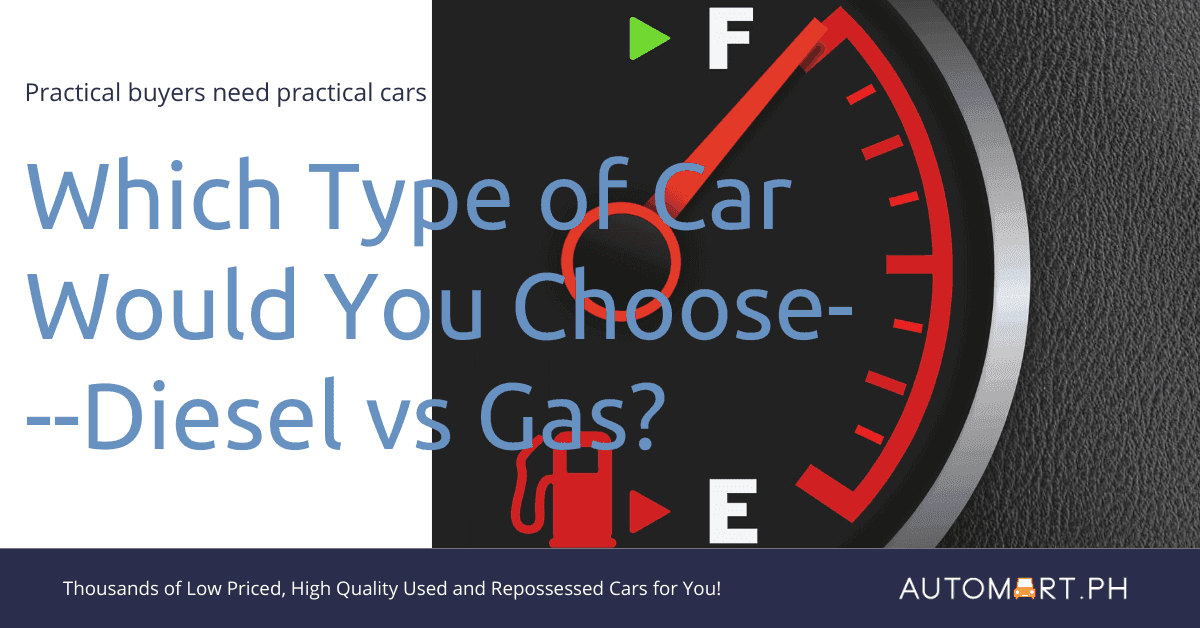
Which Type of Car Would You Choose---Diesel vs Gas?
Updated on March 05 2026
And the Winner Is---Hold On, It’s Not as Simple As That
This old debate continues because even though people are now better informed and have better ways to finally finding things out, they just can’t help themselves: they love to argue. Rather than doing the math and crunching numbers people rely on notions and conventional wisdom to make their cases.
So Automart.Ph has gone out and done the research to definitively settle the old question: Which is better---diesel or gas?
Ground Rules
To get data that is as solid and as accurate as possible, the Automart.Ph team turned their sights on the wide array of used, second-hand, and repossessed cars in warehouses and car lots all over the country. Overall, we will be looking at both the quantitative (facts) and qualitative (experience) factors to find the winner of this content. In this first article, we’ll be looking at the quantitative features, to see which one performs better in terms of fuel consumption and running costs.
In the second round, we’ll be looking into the qualitative features---what buyers and car owners see in either diesel or gas, and why they prefer one over the other. In the penultimate, we’ll close out the series with our own conclusion.
Picking the Perfect Donor Car
The first criterion is consistency (or, at the very least, similarity). To get that, the team chose a make and model that offers both diesel and gasoline engine variants.
A quick caveat: cars with diesel engines are not as plentiful as gas guzzlers. So right off the bat, it seemed like an impossible goal to accomplish. Good thing inventory coughed up the perfect donor car for this project.
The Toyota Factor
Automart found a few very good candidates but decided on the 2019 Toyota Innova E A/T, and here is where two other criteria came into play: availability and affordability. The donor cars had to be as similar as possible, and they had to be readily available in the market (second-hand or brand new), and affordable as possible.

This Innova model was it: it came in diesel and gas variants and was a popular preference of buyers off the shelf or as repo cars.
The Numbers Have It
Automart based its computations on the following:
- Car price. At retail price, diesel cars are more expensive than cars with gas, at a minimum difference of 72,000 pesos.

- Fuel type and price

- Running Costs: retail prices, fuel consumption, maintenance, and PMS costs (which may vary)


- The Breakeven Point denotes where the overall cost x total kilometer converges for all three fuel variants. From that point, the chart shows each variant’s respective running costs (overall cost x kilometers, where overall costs also include the SRP of the car) over time.

Analysis of the Data
Overall, diesel starts off more expensive (because of its buy price). But as the running costs tally up over time, diesel cars actually cost less to maintain. Innovas with gas engines, on the other hand, experienced a steady rise in expenses over time and use.
For city driving, running costs after the breakeven point is especially significant. Reaching the breakeven point more quickly isn’t surprising. What’s interesting is that all three variants start earning their worth even before hitting 25,000 kilometers.

For highway driving, the breakeven point isn’t reached until between 50,000 and 60,000 kilometers. The divergence isn’t all that significant either with all three having running costs between 1.87 to 1.96 million pesos at 150,000 kilometers (or a variance of only 121,675 pesos). On the other hand, city driving has a variance of 458,616.67 pesos at 150,000 kilometers.

Diesel Wins, Right? Yes, But Not Quite.
By the numbers, diesel is the clear winner of this round. Diesel cars may have bigger retail price tags but cost less to maintain over time and are more cost-effective choices for practical buyers.
Also, diesel cars are the more practical second-hand car option. The resale value of diesel cars makes it very attractive to a wide variety of buyers: frontliners who need a reliable and affordable daily driver; breadwinners and singles on a budget but do need a safe and secure mode of transportation; and, families looking for a second-hand car as a grocery runner and hauler.
And there we have it: Diesel wins in terms of fuel efficiency and running costs, clearly and emphatically (especially for city driving). But what about the next? In the second installment of this three-part series, Automart.Ph will tackle the qualitative data to answer the second most divisive question in the argument: “If diesel cars are more cost-effective and fuel-efficient, why are more people buying gas cars than diesel?”
Stay glued and clued in.